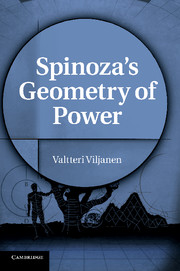Book contents
- Frontmatter
- Contents
- Acknowledgements
- Abbreviations
- Other sources
- Introduction
- Chapter 1 Spinoza on being
- Chapter 2 Causation and geometry
- Chapter 3 Power, existence, activity
- Chapter 4 The derivation of the conatus doctrine
- Chapter 5 The meaning of the conatus doctrine
- Chapter 6 Geometrical dynamics of individuality
- Conclusion
- Bibliography
- Index
Chapter 3 - Power, existence, activity
Published online by Cambridge University Press: 07 October 2011
- Frontmatter
- Contents
- Acknowledgements
- Abbreviations
- Other sources
- Introduction
- Chapter 1 Spinoza on being
- Chapter 2 Causation and geometry
- Chapter 3 Power, existence, activity
- Chapter 4 The derivation of the conatus doctrine
- Chapter 5 The meaning of the conatus doctrine
- Chapter 6 Geometrical dynamics of individuality
- Conclusion
- Bibliography
- Index
Summary
Power in late scholastic and Cartesian metaphysics
We are finally in a position to move into discussing the focal notion of this study, that of power. There is a story to be told about the concept’s fate in late medieval and early modern thought, a story which helps us to understand what is at stake when Spinoza introduces the concept into his system. Of course, scholastic discussions on power and causality are extremely complex, but I believe the following general observations to be accurate.
In medieval Aristotelian metaphysics, it went unquestioned that natural things are causally efficacious. In fact, this was commonly seen as something experience straightforwardly proves, ‘[f]or what is better known to the senses than that the sun gives light, fire produces heat, water cools?’ (MD 18.1.6). Indeed, as Des Chene comments, truths like the ones Suárez mentions here are, for the Aristotelian, ‘so obvious that merely to point out that a doctrine would have the effect of denying them was sufficient to prove its absurdity’.
- Type
- Chapter
- Information
- Spinoza's Geometry of Power , pp. 54 - 82Publisher: Cambridge University PressPrint publication year: 2011



